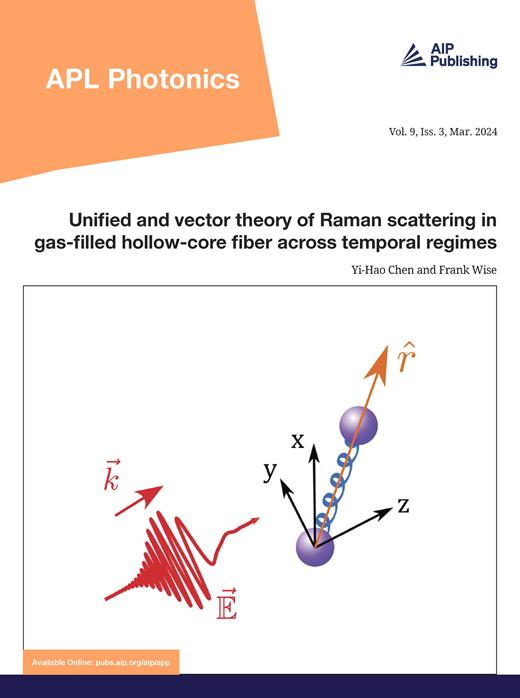Intracavity dynamics-based gain-assisted sensing with microtubule Raman microlaser
IF 5.4
1区 物理与天体物理
Q1 OPTICS
引用次数: 1
Abstract
Microcavity lasers show excellent performance as a miniaturized microsensor in various applications. However, their relatively weak power may be easily submerged in system noises and disturbed by environmental fluctuations, rendering them ineffective at detecting small signals for precise sensing. To solve this problem, the laser differential frequency-shift feedback technique is demonstrated in a microtubule Raman laser to achieve the optical gain assistance. When the microlaser is frequency-shift-modulated and returns back to the resonator, the measurement signal can resonate with the laser relaxation oscillation and be significantly enhanced. The intracavity dynamics-based enhancement makes it effective for increasing intensity changes caused by analytes. Small signals that would otherwise be buried in system noises and go undetected can be more easily resolved. In addition, the microsensor reduces the spectral measurement range and offers a way to observe the fast dynamic response. Based on that, a measurement resolution of 50 nm nanoparticle detection limit and a refractive index noise-limited resolution of 8.18 × 10−7 refractive index unit (RIU) are demonstrated. The dynamic phase transition of thermosensitive hydrogel is further investigated as a validation of its rapid detection capability. Integrated with an inherent microfluidic channel, the proposed microsensor provides a direct interaction between analytes and probe light with ultrasmall sample consumption down to 50 pl. It is expected to boost the detection of weak signals in microlasers and enlighten the development of optofluidic microsensors in exploring diverse biochemical processes.基于内腔动力学的微管拉曼微激光增益辅助传感
微腔激光器作为一种小型化的微传感器在各种应用中表现出优异的性能。然而,它们相对较弱的功率可能很容易被系统噪声淹没,并受到环境波动的干扰,使它们在检测小信号以进行精确传感方面无效。为了解决这个问题,在微管拉曼激光器中演示了激光差频移反馈技术,以实现光学增益辅助。当微激光器被频移调制并返回谐振器时,测量信号可以与激光弛豫振荡谐振并显著增强。基于腔内动力学的增强使其能够有效地增加由分析物引起的强度变化。否则会被系统噪声掩盖并未被检测到的小信号可以更容易地解决。此外,微传感器减少了光谱测量范围,并提供了一种观察快速动态响应的方法。在此基础上,证明了50 nm纳米颗粒检测极限的测量分辨率和8.18×10−7折射率单位(RIU)的折射率噪声限制分辨率。进一步研究了热敏水凝胶的动态相变,以验证其快速检测能力。所提出的微传感器与固有的微流体通道集成,在分析物和探测光之间提供了直接的相互作用,样品消耗量低至50 pl.预计它将促进微激光器中弱信号的检测,并启发光流体微传感器在探索各种生物化学过程中的发展。
本文章由计算机程序翻译,如有差异,请以英文原文为准。
求助全文
约1分钟内获得全文
求助全文
来源期刊

APL Photonics
Physics and Astronomy-Atomic and Molecular Physics, and Optics
CiteScore
10.30
自引率
3.60%
发文量
107
审稿时长
19 weeks
期刊介绍:
APL Photonics is the new dedicated home for open access multidisciplinary research from and for the photonics community. The journal publishes fundamental and applied results that significantly advance the knowledge in photonics across physics, chemistry, biology and materials science.
 求助内容:
求助内容: 应助结果提醒方式:
应助结果提醒方式:


